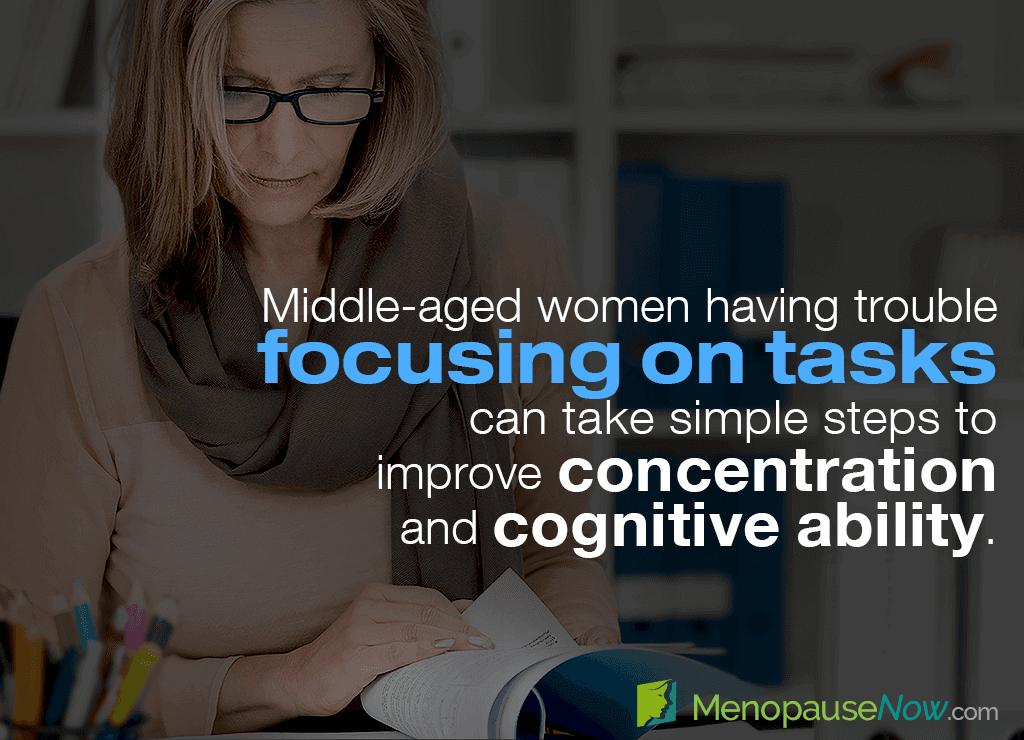Difficulty concentrating is one of the most common menopause symptoms that can plague middle-aged women's lives, causing an inability to complete tasks and keep on track with one's daily routine. Continue reading to find out what to do when having trouble focusing on tasks so that you can get back into the swing of things.
Understand When Your Focus is Best
Everyone has a daily focus pattern that fluctuates throughout the day. Some may be more concentrated in the mornings and evenings, while others find they have the highest levels of concentration throughout the early afternoon.
If having difficulty completing tasks, find your daily focus pattern so you can plan your most important activities when you have the best attention span. When your focus is weaker, plan tasks that require more practical work.
Find Out What Influences Your Attention
Women having difficulty finishing tasks should take into consideration the fact that their focus is dependent upon physical and psychological factors, including:
Sleep
Receiving too little or too much sleep can negatively impact cognitive performance. Research has actually found those receiving seven to eight hours of sleep per night mentally younger by two years.1
Consistent sleep deprivation also heightens one's risk of having diabetes, high blood pressure, and even narrowed blood vessels. All of these can provoke decreased oxygen flow to the brain, causing difficulty focusing on tasks.
Triggers
While coffee is often praised for its ability to boost concentration and mental awareness, studies have found that when consumed in excess, it may decrease performance, possibly because of overstimulation.2 Reducing its consumption later in the day also improves sleep patterns.
Moreover, alcohol can also provoke difficulty completing tasks as it is a central nervous system (CNS) depressant. Chronic alcohol abuse can lead to persistent memory problems and learning capabilities. Fortunately, abstinence often improves cognition.
Mental states
Negative emotions tend to take over one's focus, making it difficult to complete tasks and pay attention to the job at hand. On the other hand, positive emotions affect one's mentality on the contrary, expanding one's focus to be able to see the bigger picture.
Treat the Underlying Cause
Many middle-aged women suffering with difficulty concentrating are victims of hormonal imbalance, which is common as women start to transition out of their fertile years. As such, their concentration woes will only disappear once the root cause is properly addressed.
Difficulty concentrating treatments revolve around optimizing endocrine system health through lifestyle changes - balanced diet, wholesome habits, regular exercise, etc. - alongside the use of alternative medicine proven to bring relief.
By balancing hormone levels, women will not only be able to focus once again, but they will also be free of other pesky symptoms, like hot flashes, mood swings, vaginal dryness, and more.
Key Takeaways
Having an inability to complete tasks as one nears the finale of her reproductive years is not the end of the world. By acknowledging what time of the day you're most productive, being conscious of any physical or psychological factors that influence your attention, and treating the underlying cause of hormonal imbalance, you can be on your way to optimal cognitive ability far into your twilight years!
Sources
- American Addiction Centers. (2019). Short and Long Term Mental Effects of Alcohol. Retrieved December 3, 2019, from https://americanaddictioncenters.org/alcoholism-treatment/mental-effects
- Harvard Business Review. (2017). Are You Having Trouble Focusing? These Simple Strategies Will Help. Retrieved December 3, 2019, from https://hbr.org/2017/12/are-you-having-trouble-focusing-these-simple-strategies-will-help
- National Sleep Foundation. (n.d.). How Lack of Sleep Impacts Cognitive Performance and Focus. Retrieved December 3, 2019, from https://www.sleepfoundation.org/articles/how-lack-sleep-impacts-cognitive-performance-and-focus
Footnotes:
- Harvard Health Publishing. (2014). Too little sleep, and too much, affect memory. Retrieved December 3, 2019, from https://www.health.harvard.edu/blog/little-sleep-much-affect-memory-201405027136
- Institute for Scientific Information on Coffee. (n.d.). Coffee and the mind. Retrieved December 3, 2019, from https://www.coffeeandhealth.org/topic-overview/coffee-and-the-mind/




